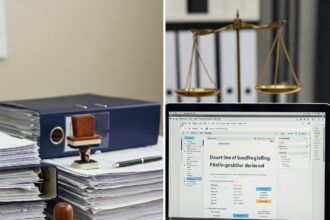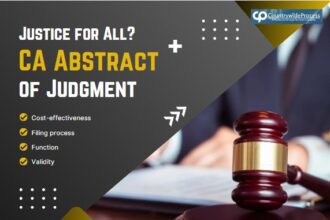As we can observe in today’s legal environment, speed is the name of the game. The conventional techniques used in developing abstracts of judgment are cumbersome and typically include errors. E-recording abstracts of judgment present a new efficiency in how legal practitioners file, record, and access judgments. This blog takes you through the legal procedure, beginning with considering the top advantages of e-recording abstracts of judgment.
Saves time and increases efficiency
E-recording abstracts of judgment include e-filing of documents, thus allowing lawyers, for example, to file documents online, reducing the need to visit courthouses. This method effectively reduces time spent online, or rather, on paperwork. Hence, through electronic recording, the entire process can be done in minutes, freeing legal teams to attend to other, more essential assignments.
In addition, e-recording enhances the period that a judgment takes to become officially recorded. When a document is filed, it is recorded, reducing the time it takes to be filed and recorded. This instant recording also boosts the records’ reliability in the general public’s interest.
Reduces Costs
E-recording of abstracts of judgment is much cheaper than other methods of recording. This way, legal professionals save time and money by avoiding printing, sending documents, and travelling. The time saved also reduces people’s costs, meaning legal teams can optimize expenditures and improve revenues.
Improves Accuracy
Manual techniques for e-recording abstracts of judgment entail the likelihood of making mistakes that stall the process and cost more. Electronic recording eliminates these risks because documents may be submitted from the computer by filling out standardized forms and templates. This makes the operation less likely to make errors, thus making the information held as accurate as possible.
Enhances Security
Recording abstracts of judgment use has several advantages over other conventional approaches to recording and providing them, one of which is security. They are prepared in electronic form, coded to avoid any form of alteration, and submitted over secure networks. However, physical documents are easier to misplace, tamper with, or steal, hence affecting the legal process.
Moreover, e-recording systems are equipped to provide the user with the complete history of the document recorded, meaning that legal practitioners can tell the status of their e-filing. This openness puts additional safeguards and measures in place for compliance.
Increases Accessibility
While offering unparalleled ease of access, E-recording abstracts of judgment is risk-free. Electronic recording of these documents also allows access to the documents anytime, from any device connected to the internet. Lawyers and other legal workers do not have to physically go to the courthouse to get the papers, which is a great convenience when there are several offices of the practice and moving lawyers.
Also, it nearly eliminates the time to search for recorded documents once they are e-recorded. Thus, irrespective of whether there is a need for a court appearance, a meeting with the client, or case preparation, the relevant records are accessible to legal persons without delay.
Supports environmental sustainability
E-recording abstracts of judgment helps reduce paper, ink, and storage space, promoting sustainability. Conventional filing systems entail the physical arrangement of documents, which uses many papers and, hence, generates a lot of waste. On this front, electronic recording reduces the need for paper in a legal process, making it the best system for a sustainable environment.
Besides, e-recording reduces the utilization of physical files and space in the office and the time and resources needed to sort, store, and maintain files. Documents are kept online, and thus, there is no need for cabinets or rooms to store such documents and records.
Ensures compliance with legal requirements
E-recording the abstract of judgment guarantees fulfilling the requirements of current legislation and normative documents. It is now common for many jurisdictions to accept electronic submissions or even prefer them, and hence, electronic recording systems are created to suit these needs.
In this way, the chances of failing to meet the legal requirements of a case can be avoided, thus preventing legal consequences such as fines or time consumption in the course of legal procedures.
Also, e-recording systems have predefined checks and validation in which the required fields must be filled and documents to be recorded meet the required standards. This makes rejections or delays slim, thus allowing legal professionals to meet some fundamentally time-sensitive deadlines.
Simplifies record-keeping
E-recording abstracts of judgment simplify record-keeping by storing all documents electronically in a centralized database. This makes it easier for legal professionals to organize, search, and retrieve records as needed.
Electronic records are also more accessible to back up and preserve, ensuring that important documents are not lost due to physical damage or misplacement.
Enhances client service
Clients expect prompt and efficient service from their legal representatives. E-recording abstracts of judgment allows legal professionals to provide faster and more reliable service, as documents are recorded and accessible in real time. This speed and efficiency improve client satisfaction, leading to more successful resolutions and higher levels of client confidence.
Embraces technological advancement
The legal industry is evolving, and technology plays an increasingly important role. E-recording abstracts of judgment allows legal professionals to stay ahead of the curve. By adopting electronic recording, legal teams demonstrate their commitment to innovation and efficiency, enhancing their reputation and competitiveness in the legal market.
Conclusion
E-recording abstracts of judgment offers numerous benefits for legal professionals, from saving time and reducing costs to improving accuracy and security. This innovative approach streamlines the legal procedure and enhances the overall efficiency of legal teams.
By adopting e-recording, legal professionals can provide better service to their clients, stay compliant with legal requirements, and embrace the legal industry’s future. As technology advances, the benefits of electronic recording will become even more apparent, positioning legal professionals for success in a rapidly evolving landscape.





